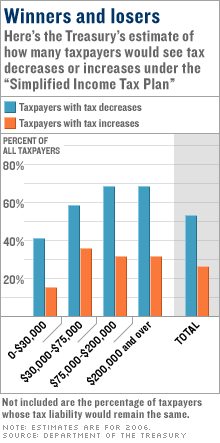 |
|
|

|
| John Snow, treasury secretary, talks about tax code changes on CNN's In The Money. |
Play video
|
|
|
|
|
|
NEW YORK (CNN/Money) – Charged with proposing ways to make the federal tax code simpler, fairer and more growth-oriented, President Bush's bipartisan tax advisory panel put forth a Simplified Income Tax Plan with many changes that could alter individuals' tax bills.
The distribution of the federal tax burden among income groups is roughly similar to what it is under the current code.
But because of the proposed removal of deductions and some credits, the picture for individuals is more of a mixed bag. Notable recommendations include the elimination of the state and local tax deduction and the child-care credit, as well as the curbing of the mortgage-tax break.
The panel in its final report acknowledges that "from the perspective of one's tax bill, the Simplified Income Tax Plan is certain to generate both 'winners' and 'losers.'" According to Treasury estimates, there should be more winners than losers in every income group (see bar chart at right).
But those who see an increased tax bill could benefit in other ways. The panel's proposals are intended to provide greater simplicity, for example, and that could mean lower tax preparation costs. And if a tax reform plan is adopted that promotes greater economic growth, that has the potential to benefit all taxpayers.
Of course, the panel's proposal was never intended to be a tax bill to be voted on yea or nay in its entirety. Indeed Treasury Secretary John Snow characterized the panel's report as a starting point for the Treasury, which will present its recommendations to President Bush by the end of the year.
But if and when the tax reform debate is taken up by lawmakers you can be sure "people will react with their pocketbooks," said Mark Luscombe, principal analyst for tax publisher CCH.
CCH compared how some taxpayers would do under the current code to how they would fare under the Simplified Income Tax Plan. Generally speaking, Luscomb said, those who are more likely to do better under such a plan would include:
- Those with high incomes and few deductions because of the proposed drop in the top tax rate from 35 percent to 33 percent.
- Taxpayers whose income comes largely from investments, since the capital gains rate would drop significantly and dividends would be tax free.
- Many taxpayers who now claim the standard deduction because it will be replaced with a family credit that's a dollar-for-dollar reduction of their tax bill.
- Two-earner married couples, since the marriage penalty is eliminated under the proposal.
(For a look at these and other changes in the panel's proposal, click here.)
Those who likely would do worse would be taxpayers in high-tax states and states with high home prices, Luscombe said, because of the elimination of the state and local tax deduction as well as a curbing of the tax break allowed for mortgage interest.
Below is a table detailing some of the scenarios analyzed by CCH.

How would you fare?
The bipartisan tax-advisory panel appointed by President Bush made recommendations that could alter your tax bill. The scenarios below come from an analysis by tax publisher CCH. |
| |
Unmarried
One child under 17
Wages: $20,000 |
$2,132 refund |
$1,069 refund |
Gets $1,063
less in refund |
| |
Unmarried
One child under 17
Wages: $32,000 |
$1,223 |
$500 |
Pays $723 less |
| |
Married
Both spouses work
Two kids under 17
Wages: $50,000 |
$1,350 |
$1,200 |
Pays $150 less |
| |
Married
Both spouses work
Two kids under 13
Wages: $50,000
Childcare expense: $6,000 |
$150 |
$1,200 |
Pays $1,050 more |
| |
Married
Two kids under 17
Itemizes deductions
Income: $100,000
Deductions: $15,000* |
$9,380 |
$9,425 |
Pays $45 more |
| |
Married
Two kids
Itemizes deductions
Income: $300,000**
Employer-provided health insurance: $15,000
Deductions: $50,000** |
$61,520 |
$65,407 |
Pays $3,887 more |
| |
Single
No kids
Wages: $50,000
Donations: $2,000 |
$7,115 |
$6,575 |
Pays $540 less |
| |
Single retiree
Over 65
Social Security: $14,000
Pension: $20,000 |
$1,368 |
$2,250 |
Pays $882 more |
*Includes $9,000 in mortgage interest, $4,500 in state and local taxes; $1,500 donations.
** Investment income includes $3,000 in dividends; $10,000 in long-term capital gains. Deductions include $5,000 donations, $15,000 in state and local taxes, $20,000 in mortgage interest on principal home and $8,000 mortgage interest on vacation home; $2,000 interest on home-equity loan. |
|